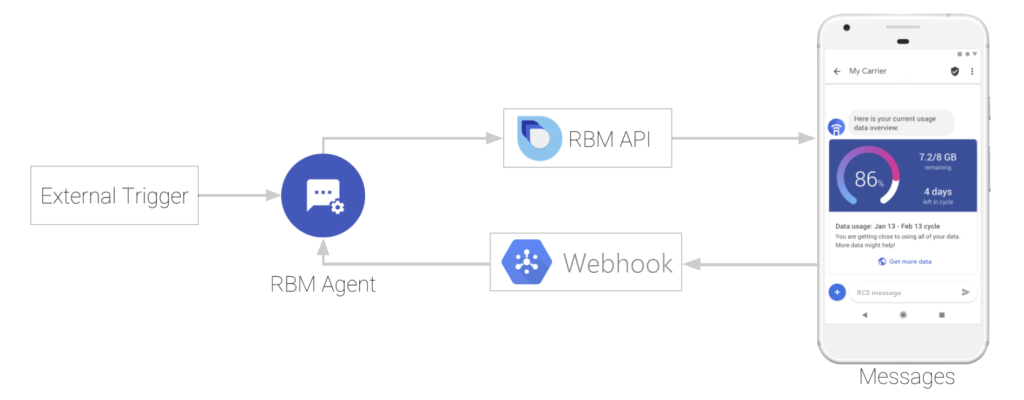Following the successful adoption of RCS in 2024, with its integration into the Apple ecosystem, the protocol’s trajectory looks promising. With this milestone achieved, RCS appears poised for a bright and transformative future. However, this new adoption wave is followed by a more silent business-oriented but equally important revolution called RCS Business Messaging, or RBM.
Today, we will discuss how RCS Business Messaging (RBM) reshapes our understanding of business-to-customer communication. In short, RBM enables brands to engage customers through rich media and interactive messaging, creating a more personalized experience. This shift towards business messaging solutions opens up a world of possibilities for customer engagement. How? By making it easier for companies to deliver targeted content directly to consumers without needing the installation of an additional application.

However, it’s important to recognize the challenges RBM faces in achieving its full potential. Fragmentation in the ecosystem, where companies and users are unsure about RCS availability and features like encryption, presents a significant hurdle.
Understanding the significance of RBM in modern communication is crucial for businesses looking to enhance their mobile marketing strategies. With the right approach, companies can leverage branded messaging and secure communication to foster deeper connections with their audience.
The RBM Market Opportunity
RBM combines the universal reach of SMS with the advanced capabilities of Rich Communication Services. This offers a unique opportunity for brands to engage with customers more effectively and personally. Let’s look at some of the most important arguments regarding RBM’s growing market potential.

Growing Adoption
The adoption of RBM is accelerating as businesses seek innovative ways to enhance customer interaction. According to Mobilesquared, RCS users will increase from 2.44 billion to 2.79 billion worldwide in 2025 thanks to the iOS boost. The total number of RCS users worldwide is expected to exceed 3.6 billion by 2028. (With the highest penetration in North America and West Europe.) This growth is also fueled by a set of benefits for the end-user. RCS offers natively all the benefits of the so-called OTT messaging apps: rich media, group messaging, read receipts, typing indicators, making video calls, and more.
RCS Requires No App
One of RBM’s most compelling advantages is its native functionality on both Android and iOS devices. Unlike other messaging platforms that require third-party apps, RCS aims to eventually operate directly within the default messaging app of every smartphone. For now, this ambition appears highly achievable, as more and more devices, operators, and manufacturers seem to be on board with this trend and adapt. However, as we speak, the ubiquity of RCS is still not in place, and many phones require the installation of the Google Messages App.
Although there are a few steps to be taken toward global adoption, one thing is clear: RCS’s promise of direct communication simplifies the user experience, allowing brands to engage customers without barriers.
The Holy Grail of Direct B2C Marketing Campaigns
In the absence of RCS, companies who want to use direct messages duplicate their campaigns on multiple apps to cover all the communication preferences of their user base. This implies that companies were left with only two less-than-ideal options.
- Go for the universally accepted SMS campaigns, accepting their limitations.
- Launch highly complicated multichannel campaigns, duplicating the same message for multiple apps, and spending a fortune on creating, running, and optimizing the campaigns.
In contrast, RCS Business Messaging (RBM) promises to unite the best of both worlds: universality and rich communication in one single campaign.
The Trust Advantage of RCS Business Messaging (RBM)
Promotional messages sent via RCS (Rich Communication Services) offer a significant trust advantage over traditional SMS. Unlike SMS, which is increasingly associated with risks like smishing (SMS phishing) and malicious links, RCS incorporates verified branding elements that instantly reassure consumers. Features such as a sender’s logo, company name, and official contact information are prominently displayed, providing a professional and authentic appearance.
Another key benefit is the built-in company identity verification process. Verification is handled by trusted entities such as Google, mobile operators, or service providers. This ensures that only legitimate businesses can send RCS messages, reducing risks like smishing or malicious links.
By combining engaging multimedia capabilities with robust verification mechanisms, RCS stands out as a secure and reliable channel for promotional messaging, enabling businesses to connect with their audiences more effectively and build lasting trust.
Impressive Growth Potential
Rich Communication Services (RCS) business messaging is projected to experience remarkable growth, with RBM spending increasing by 929.32% between 2024 and 2028 at a CAGR of 79.10%, according to Mobilesquared. Early on, over 80% of spend will come from Asia and Latin America, expanding globally to nearly 40% by 2028. By 2026, RCS is expected to exceed $1 billion in platform revenue, with iOS adoption boosting earnings by over 30% by 2028.
These figures highlight RCS’s ability to attract brand investment through rich, interactive, and engaging customer messaging experiences. Its rapid growth and global adoption make it an essential tool for maximizing marketing ROI.
Enhanced Customer Engagement
Rich Communication Services (RCS) is revolutionizing customer engagement by transforming traditional messaging into an interactive experience. With RCS, businesses can send rich media messages that include images, videos, and interactive buttons, significantly enhancing customer interaction. Notably, RCS messages boast a 50% open rate within the first 15 seconds and achieve a 2.5 times higher conversion rate than SMS. This illustrates its effectiveness in capturing customer interest and driving action.
The technology is booming, with Synch reporting brands sent 25,000 times more RCS messages in November 2023 than in February 2022. As businesses adopt RCS, they benefit from advanced analytics that allows for real-time tracking of customer interactions, enabling them to refine their communication strategies. Overall, RCS not only enhances customer engagement but also contributes to improved business performance.
Use Cases of RCS Campaigns Beyond OTP – The Sky is the Limit
RCS Business Messaging (RBM) has opened up a world of business possibilities. Applications extend far beyond traditional SMS use cases like One Time Passwords (OTP). The versatility of RCS allows brands to engage with customers in innovative ways, enhancing marketing campaigns and customer relations. From transactional notifications to event invitations, the potential applications of RBM are virtually limitless. Several compelling use cases illustrate how various industries can leverage RCS to improve customer engagement and streamline communication:

1. Transactional Notifications
RCS can effectively send transactional notifications, such as purchase confirmations, appointment updates, and shipping information. For example, in the e-commerce sector, brands can send detailed order confirmations, including images of the purchased items and tracking links. This keeps customers informed and enhances their shopping experience by providing all necessary information in one interactive message. According to Gupshup, businesses using RCS for transactional messages report higher satisfaction rates among customers due to the rich media content.
2. Customer Feedback Requests
Customer feedback is vital for any business looking to improve its services or products. With RCS, companies can send interactive surveys directly within the native messaging app. This makes it easy for customers to provide feedback about their recent purchases or experiences. For instance, a restaurant could follow up with diners after their meal, asking them to rate their experience with quick reply buttons for various ratings. This creates an immediate feedback loop that is invaluable for continuous improvement and customer satisfaction.
3. Multi-Use Messages
RCS allows for multi-use messages that combine both transactional and promotional content. For example, an airline could send a boarding pass along with an upgrade offer for a premium seat. This dual-purpose messaging not only provides essential travel information but also encourages additional purchases in a seamless manner. Such integrated messaging is particularly effective in industries like travel and hospitality, where timely information is crucial.
4. Trusted Promotional Messages
Trusted promotional messages are another powerful application of RCS Business Messaging. Brands can send offers, promotions, discounts, and reminders for abandoned shopping carts directly to consumers. For instance, a retail store could send an RCS message featuring a limited-time discount on a customer’s favorite products, complete with images and a direct link to purchase. This approach not only drives sales but also encourages customer loyalty. Research indicates that promotional messages delivered via RCS have a 35 times higher read rate than emails. Of course, one of the main reasons is the extra trust element that RCS comes with when compared to SMS, as we’ve shown a few paragraphs back.

5. Fraud Alerts
RCS can also send alerts about suspicious account activity or potential fraud directly to customers’ devices. Financial institutions can send real-time notifications that include details about the transaction and options for the user to confirm or dispute it right from the message. This proactive communication helps build trust and enhances security measures simultaneously. In parallel, financial institutions (but not only them) can further simplify their users’ lives by switching from the old 2-factor authentication to an automatic mobile identity solution.
6. Service Updates
Businesses can leverage RCS to provide updates on product warranties, terms of use, and customer status changes. For example, a software company could notify users about upcoming updates or changes in service terms through rich media messages that include links to detailed documentation or support resources. This keeps customers informed and engaged with the brand.
7. Event Invitations
RCS is an excellent tool for sending invitations and reminders for events, webinars, or conferences. Businesses can create attractive event invitations with clickable RSVP buttons and links to add events directly to calendars. For instance, a tech company hosting a product launch could send an interactive invitation with event details, speaker bios, and even maps to the venue. This engaging format boosts attendance rates and ensures recipients have all the necessary information at their fingertips.
As you can imagine, these examples only scratch the surface of what RCS Business Messaging campaigns can deliver. The flexibility and richness of RCS make it an invaluable asset for businesses looking to enhance their communication strategies across various sectors. As more companies adopt RBM, the potential for innovative marketing campaigns will continue to expand, enabling brands to connect with customers in meaningful ways that were previously unattainable through traditional messaging channels.
The Hurdles of RCS: Fragmentation, Awareness, and Security
RCS messaging, while promising, faces significant challenges in its adoption and functionality. One of the primary issues is fragmentation within the ecosystem, where users and companies are often uncertain about the availability and specific features of RCS, such as end-to-end encryption. This inconsistency can lead to confusion, as not all carriers or devices support the same RCS capabilities, making it difficult for users to rely on the technology universally.
Another challenge is low consumer awareness. Many users remain unaware of RCS and its enhanced features compared to traditional SMS, which hinders widespread adoption. This lack of understanding can be particularly pronounced among less tech-savvy demographics, making it essential for businesses to educate their customers about the benefits of RCS messaging. Additionally, security concerns arise from uneven implementation of encryption protocols among different carriers, potentially exposing users to vulnerabilities.
Finally, RCS competes with well-established messaging apps like WhatsApp and iMessage, which already offer rich features and a loyal user base. Despite all the obvious benefits we’ve outlined, competition poses a significant hurdle for RCS to gain traction in a market dominated by these alternatives. However, we believe RCS ubiquity will eventually break the pattern of geographically segregated messaging apps.
Conclusion
In conclusion, RCS Business Messaging (RBM) is transforming business-to-customer communication by merging the universal reach of SMS with rich, interactive features. Its growing adoption and market potential offer businesses unique opportunities to enhance engagement, streamline communication, and boost ROI. From transactional updates to promotional campaigns, RBM’s versatility allows brands to connect with customers in impactful, personalized ways—all without requiring third-party apps.
However, RCS messaging faces significant challenges, including ecosystem fragmentation, low consumer awareness, inconsistent encryption protocols, and competition with established messaging apps like WhatsApp and iMessage.If you’re ready to harness RBM for your business, contact Global Telco Consult (GTC) today.
Global Telco Consult (GTC) is a trusted independent business messaging consultancy with deep domain knowledge in application-to-person (A2P) services. GTC provides tailor-made messaging strategies to enterprises, messaging service providers, operators and voice carriers. We have expertise in multiple messaging channels such as RCS, Viber, WhatsApp, Telegram and SMS for the wholesale and retail industry. Additionally, GTC offers Digital Identity and Fraud advisory services, aiding clients in navigating the complexities of digital identity verification and fraud prevention, while also providing Recruitment services, assisting businesses in acquiring top talent within the telecom and technology sectors.
GTC supports its customers from market strategy through service launch, running the operations and supporting sales and procurement. The company started in 2016 with a mission to guide operators and telcos to embrace new and exciting opportunities and make the most out of business messaging. For more information or industry insights, browse through our blog page or follow us on LinkedIn.


